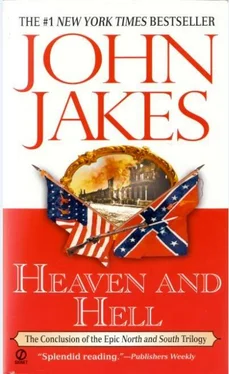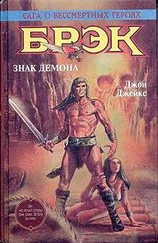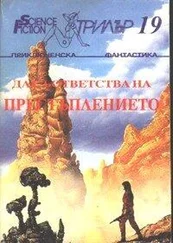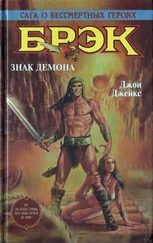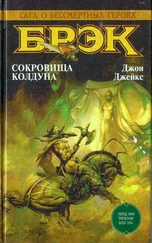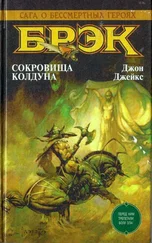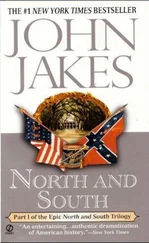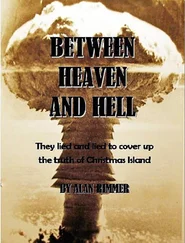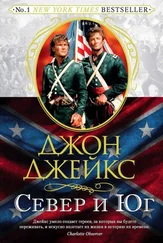If, in the sections set in the South, there seems to be a certain shrillness, almost hysteria, in some characters, I hasten to note that this originated in research, not imagination. The racist statements of fictional characters such as LaMotte and Gettys are based on similar pronouncements from the press of platform. On the matter of this overreaction, I agree with the film historian and biographer Richard Schickel, and the revisionist historian Kenneth M. Stampp. Schickel, commenting on Stampp in the former's fine life of D. W. Griffith (who was the son of a Confederate officer, a circumstance that contributed to the racist tone of Griffith's epic The Birth of a Nation), says, "The alleged brutalities suffered by the white southerners are difficult to find in any records; compared to the lot of almost any defeated nation in history, their 'punishment' was unprecedentedly mild." True; but — emotionally — defeat is still defeat. A bitter cup, and, in this case, a cup poisoned by unreasonable and long-standing fears of those the South had enslaved. The word hysteria fits.
To this day, a firestorm of controversy burns around General George A. Custer. A case can be made for Custer as a fine soldier, or at least a successful one. He had an amazing record of wins with the Union Army. He generated tremendous loyalty among some of his men (in others he aroused fanatic hatred, and this was a problem in the Seventh Cavalry from the moment he joined the regiment until he led it to disaster at the Little Big Horn).
My interpretation of Custer is admittedly personal. I find too many negatives. His vanity was overwhelming, and so was that of his wife, which only fed it. He can't be excused for refusing to command black soldiers in the Ninth Calvary. His punishments were harsh, frequently illegal, and many of his adventures in the field were reckless or personally motivated; the dash to his wife Libbie that got him court-martialed is a good example. Most of all, to his discredit, there is the Washita — the battle or the massacre, depending on which source you consult. To me certain aspects of the Washita bear an eerie similarity to Vietnam. A frustrated Army, up against guerrilla fighters whose unconventional tactics it was too cumbersome to match, moved in and destroyed an entire village — men, women, children — the theory being that even small boys might wield weapons against their enemies (some evidently did).
Probably I will be suspected of romanticizing the record and accomplishments of the soldiers of Grierson's Tenth Cavalry. I plead not guilty. The Army offered these black troopers their first formal opportunity to get up and out of their past lives in northeastern cities, and they took splendid advantage of it. Most military scholars agree with author George Walton, who said of the Tenth: "The soldiers ... developed an espirit de corps that has seldom been equaled in the United States Army. ... The desertion rate, always an index of morale, became the lowest in military history." White officers, initially so reluctant, eventually commanded in the Tenth with great pride. John Pershing won his nickname, Black Jack, during such a tour of duty.
I should also note that, although there was a C Company in the Tenth Cavalry, the officers and men of C Company in the novel are fictitious. The incidents of white harassment of the new regiment by General William Hoffman and others are not.
Although trumpets and bugles are distinctly different instruments, the Army circa 1865-70 ignored that. General orders of the period refer to various daily calls as "trumpeter assemblies." But no cavalryman that I've ever heard of fingered the valves of a trumpet while galloping on horseback. In other words, in this period, trumpeters played bugles but were nevertheless called trumpeters.
As a final note, Henry Ossian Flipper demands mention. Flipper, of the West Point class of 1877, was the first black graduate of the Military Academy, the first black officer in the Tenth Cavalry, and also the first in the regular Army. He was born in slavery in Georgia in 1856, and he got through West Point despite virtual ostracism. "There was no society for me to enjoy," he wrote. "No friends, male or female, so absolute was my isolation." Yet Flipper persevered in the face of heartbreaking difficulty, and so have many black soldiers since, to their great credit.
Now for appropriate acknowledgments.
Unless otherwise noted, newspaper headlines, dispatches, and advertisements are from The New York Times.
"The Confederacy's purple dream," a beautiful phrase that I have incorporated in the text, comes from Samuel Eliot Morison.
An anecdote from historian Robert West Howard led to creation of the Fenway Piano Company.
Colonel John W. DeForest, mentioned above, wrote one of the major memoirs of the period at his post in South Carolina. I have made generous use of A Union Officer in the Reconstruction for details contained in Madeline's journal.
In making DeForest and so many other books, periodicals, and newspapers available to me, I must first thank the endlessly helpful staff of the Greenwich Public Library. For years I've been what you might call a heavy user of libraries, and I have never before seen such a splendid one in a town the size of Greenwich.
On Hilton Head Island, the local library was diligent as usual in searching out interlibrary materials; particular thanks here to Ruth Gaul and Sharon Lowery. Librarians in South Carolina are fully as enthusiastic as those in Connecticut, the difference being the poor level of financial support South Carolina libraries receive. A majority of county and state legislators seems to care more about tourism and state-supported football teams than they do about learning, and this attitude shows in the inadequacy of many local collections. The librarians, always of good cheer, make the best of a bad situation.
Robert E. Schnare of the Special Collections Division of the United States Military Academy, West Point, New York, was again helpful in providing special materials. Another important piece of research came from the Tennessee State Library.
Assistance with special research projects was provided by my good friend Ralph Dennler, my son Michael Jakes, my son-in-law Michael Montgomery, and my wife.
I also owe thanks to Bill Conti, to Al Kohn of Warner Bros. Records, and to Mrs. Auriel Sanderson, vice president of the David L. Wolper Organization.
As always, people and institutions lending a hand with preparation of the book must not be held responsible for it in any way; not for a single incident or opinion or anything else. I bear full responsibility.
Since Heaven and Hell closes a trilogy undertaken with a brief description and a great deal of faith, I would be remiss if I did not tender my thanks to Bill and Peter Jovanovich and all of the good people I have gotten to know during the course of the project. I think especially of Rubin Pfeffer; Willa Perlman; my magnificent editor, Julian Muller; and his efficient and cheerful right hand, Joan Judge.
Through HBJ I was first introduced to Paul Bacon, whose powerful jackets have lent strength to the books in the trilogy, and to thousands of others as well. Paul stands at the top of his profession, and because of his work on North and South and its sequels, we have become friends as well as collaborators on a children's book of our own. That kind of good luck is one of the joyous side benefits of publishing.
Frank R. Curtis, Esq., my able attorney and friend, remains a source of strength and wise counsel. In England, my agent, June Hall, and Ian and Marjory Chapman of Collins Publishers have been steadfast in their interest and encouragement.
Some books are easy to write, some are not. This was one of the latter, because of circumstances that had nothing to do with writing. In the midst of work on the first draft I lost my mother-in-law, Nina, to a cruel disease. She was a lovely, courageous woman, small in size but great in wisdom and spirit. She was born and lived most of her life in a conservative Illinois farm town. There she not only raised a strong family but publicly supported black's and women's rights long before either cause was fashionable. She stood by me at all times, and especially at a difficult time a few years ago when many others did not. I loved her with all my heart, and her death in October of 1986 was a grievous loss for all of us who cared for her. Against that event, both impending and actual, Heaven and Hell was written.
Читать дальше
